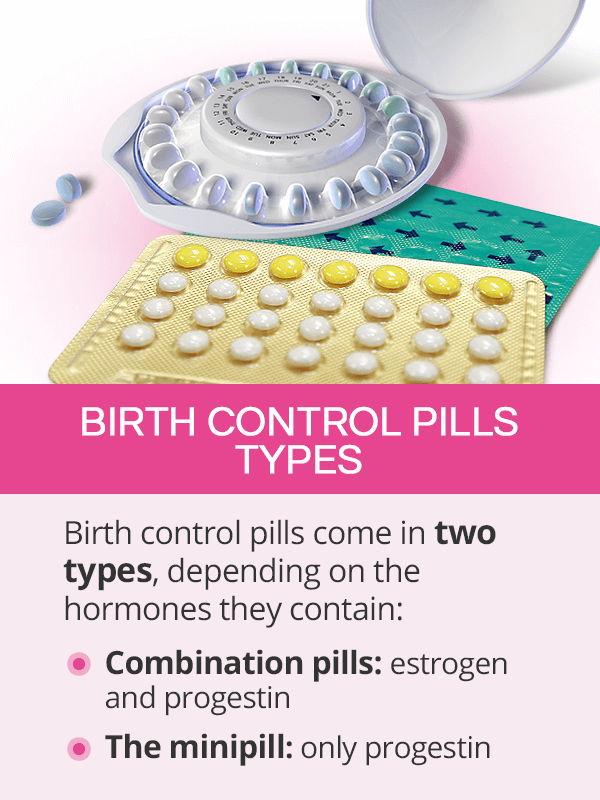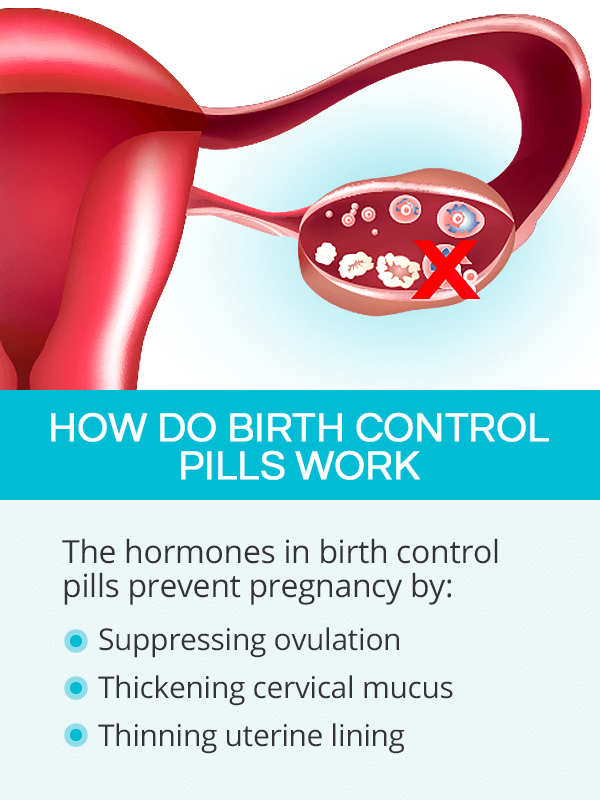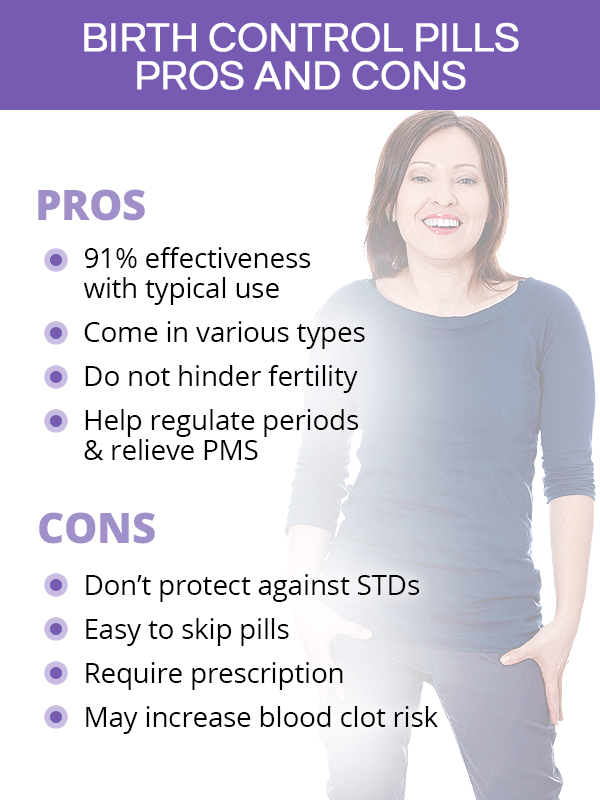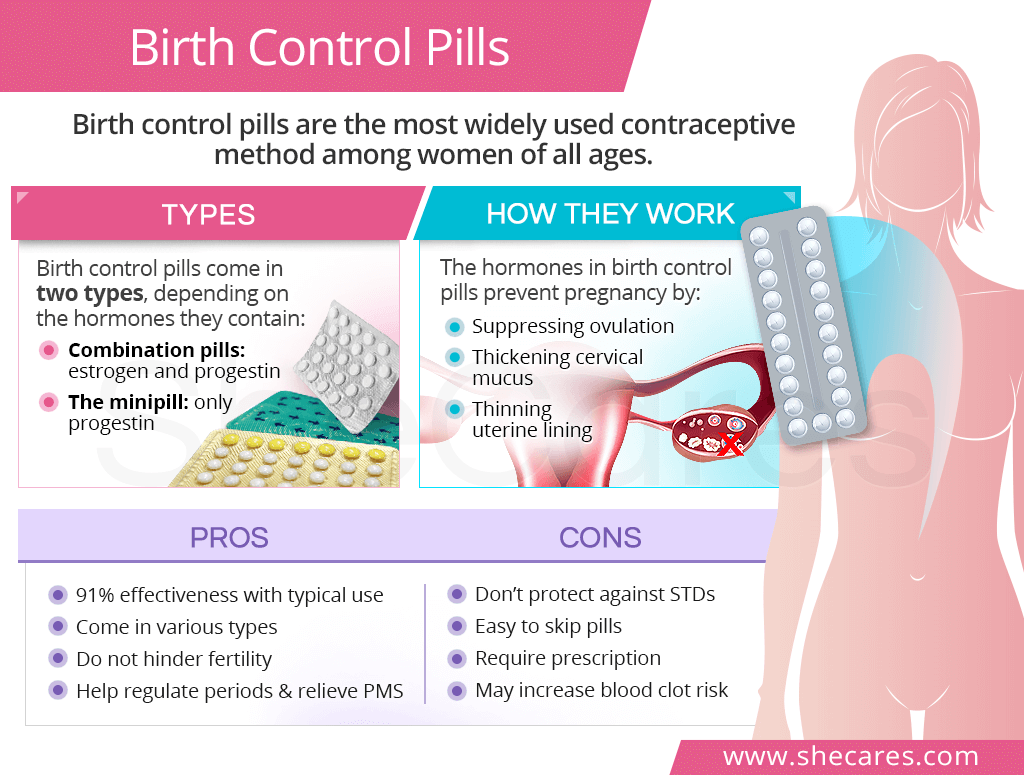About Birth Control Pills
Birth control pills are a type of hormonal contraceptive method. They contain varying doses and combinations of synthetic hormones, aimed at preventing pregnancy. They are also referred to as oral contraception or, simply, the pills.
The pills may also be prescribed for non-contraceptive reasons, including to treat irregular periods, relieve premenstrual syndrome (PMS), and reduce symptoms of polycystic ovary syndrome (PCOS), among others.
Birth Control Pills: Types
There are two main types of birth control pills, depending on the hormones they contain:
Combination pills contain varying amounts of estrogen and progestin (a form of progesterone). They are further classified as conventional or continuous, both of which are discussed in the next section.
Progestin-only pills, as the name suggests,contains only progestin.The pill is often called the minipill.
How to Use Birth Control Pills

Regardless of their type, birth control pills are taken the same way: one pill per day, preferably around the same time.
However, the monthly schedule will vary depending on their type as well as a woman's reproductive needs and health status.
How to Use Combination Birth Control Pills
Combined oral contraceptive pills can be taken conventionally and continuously. Their schedule is as follows:1,2
Conventional birth control pills. Most commonly, a woman takes one active pill daily for three weeks, followed by a week on inactive (placebo) pills. This allows for a period every month. Various brands may offer packs with 24 active and 4 inactive pills, while others contain just 21 active pills with no pills to be taken during seven days.
Continuous birth control pills (or extended cycle pills). A woman takes one active pill fora consecutive 84 days, followed by seven days on inactive pills. This allows for only four periods per year. Also, there is a 365-day pill, which is take every day throughout the year, essentially stopping periods or making them very scarce and infrequent.
How to Use Progestin-Only Pills
How to take the minipill is much more straightforward in comparison to combined pills.
Each pack contains 28 active pills with no placebo. A woman takes one pill per day for four weeks. During the fourth week, she may still get her period. For the minipill to be effective, it should be taken within the same three-hour period every day.3
How do Birth Control Pills Work

Once they enter the body, the hormones contained in oral contraceptive pills change the levels of the body's natural hormones. This prevents pregnancy through the following actions:
- Stopping or suppressing ovulation
- Thinning uterine lining to make it harder for the egg to attach to its wall
- Thickening cervical mucus to make it more difficult for the sperm to get through the tract
It takes about two days for the minipill and about seven days for combination pills to start working. If a woman takes the pills within the first five days of a period, she is protected right away. If taken more than five days since beginning a period, a back-up birth control method is recommended.3,4
Birth Control Pills Pros and Cons

Oral contraceptive pills are a popular and reliable method of preventing unplanned pregnancy, granted they are taken as required. However, their use involves the risk of human error and other factors that should be taken into account.
Birth Control Pills Pros
- Birth control pills are 91% effective with typical use. With perfect use, the pills are said to be 99% effective.5
- The pills come in various types to fit a woman's needs, lifestyle, and budget. They are considered affordable.
- Once stopping their use, fertility generally returns within three to six months.6
- A steady dose of hormones in the pills may help regulate periods, relieve PMS, reduce acne, and more.
- Progestin-only contraceptive pills are a good option for women who cannot or do not want to take estrogen.
Birth Control Pills Cons
- Birth control pills do not protect against sexually transmitted diseases (STDs).
- They require significant daily diligence, making it easy to forget the dose and reducing their effectiveness.
- They cost up to $50 per month and require doctor's prescription, thus increasing medical costs.1
- Some medications and supplements may reduce the effectiveness of birth control pills.
- Contraceptive pills may increase blood clot risk, especially for those who smoke or have blood pressure or clotting problems.7
Key Takeaways
Millions of women around the world choose birth control pills as their go-to contraceptive method. The two main types include combined pills and progestin-only pills. Containing varying concentrations of progestin with or without estrogen, they make it easy for women to choose the best option for their medical needs, lifestyle, and budget. The pills prevent pregnancy by stopping ovulation, thinning the uterine lining, and thickening cervical mucous. With perfect use, contraceptive pills are said to be 99% effective; however, most people do not use them correctly, thus reducing their effectiveness to 91%. They can help regulate women's periods and relieve PMS, but they do not protect again STDs. Nevertheless, with proper use, oral contraceptives can prove to be a safe and reliable contraceptive option for women of all ages.
Sources
- Contraception and Reproduction. (1989). Contraceptive Benefits and Risks. Retrieved August 4, 2020 fromhttps://www.ncbi.nlm.nih.gov/books/NBK235069/
- Mayo Clinic. (2019). Combined birth control pills. Retrieved August 4, 2020 fromhttps://www.mayoclinic.org/tests-procedures/combination-birth-control-pills/about/pac-20385282
- MedlinePlus. (2020). Birth control. Retrieved August 4, 2020 from https://medlineplus.gov/birthcontrol.html
- National Blood Clot Alliance. (n.d.). Is it true that birth control pills cause blood clots? Retrieved August 4, 2020 fromhttps://www.stoptheclot.org/about-clots/webinar_contra/birth_control_clots/
- NHS. (2018). The progestogen-only pill. Retrieved August 4, 2020 fromhttps://www.nhs.uk/conditions/contraception/the-pill-progestogen-only/
- Office on Women's Health. (2017). Birth control methods. Retrieved August 4, 2020 fromhttps://www.womenshealth.gov/a-z-topics/birth-control-methods
Footnotes:
- TeensHealth. (2017). Birth Control Pill. Retrieved August 4, 2020 from https://kidshealth.org/en/teens/contraception-birth.html
- Mayo Clinic. (2020). Choosing a birth control pill. Retrieved August 4, 2020 from https://www.mayoclinic.org/healthy-lifestyle/birth-control/in-depth/best-birth-control-pill/art-20044807
- NHS. (2018). The progestogen-only pill. Retrieved August 4, 2020 from https://www.nhs.uk/conditions/contraception/the-pill-progestogen-only/
- Cleveland Clinic. (2018). Birth Control: The Pill. Retrieved August 4, 2020 from https://my.clevelandclinic.org/health/drugs/17707-minipill
- Planned Parenthood. (n.d.). Birth Control Pill. Retrieved August 4, 2020 from https://www.plannedparenthood.org/learn/birth-control/birth-control-pill
- MedlinePlus. (2020). Birth control pills. Retrieved August 4, 2020 from https://medlineplus.gov/ency/article/007460.htm
- CDC. (2020). Contraception. Retrieved August 4, 2020 from https://www.cdc.gov/reproductivehealth/contraception/index.htm
